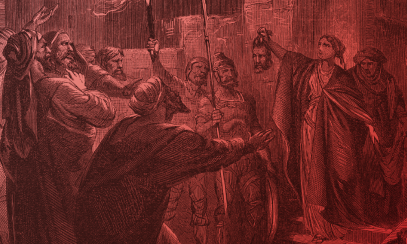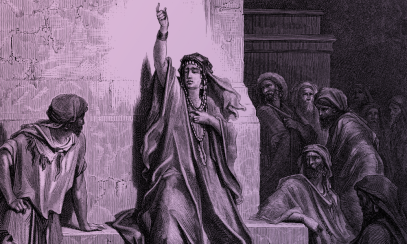The Restoration of Marriage
The Extraordinary Synod of Bishops on the Family in October 2014 and the upcoming Ordinary Synod on the Family in October 2015 have made reflection on the vocation and mission of the family both in the Church and in the modern world very timely. So during 2015, Theology 101 continues to explore the Church’s teaching on many of the themes being considered by the two synods.
The kingdom of heaven
In the last column on the gift of children, we began with a reference to the very first paragraph of the prologue to the Catechism of the Catholic Church (CCC) which explains that the human person is freely created by God to share eternal life in communion with God. Another name for this state of communion with the Father, Son and Holy Spirit is the kingdom of heaven.
Jesus speaks of this kingdom of heaven in many of his parables. For example, according to the Gospel of Matthew, the kingdom is like the yeast that causes the whole mass of dough to rise (13:33); like a buried treasure in a field (13:44); like the search for a fine pearl (13:45); like the good wheat that grows up among the weeds (13:30); and like a mustard seed (13:31). Each of these are things that are hidden from sight in the beginning but that are bountiful and of immense value when they are revealed in full.
We also learn from these images that something must be done in order to facilitate the springing forth of this reign. The yeast must be kneaded into the dough; the buried treasure and fine pearl must be uncovered; and the seed must be planted.
Furthermore, the kingdom does not blossom instantly. It reveals itself over time. The seed produces first the blade, then the ear, and finally the ripe wheat in the ear. (Mk 4:28)
It also requires a total commitment on our part. We, too, must go and sell everything in order to buy the field where the treasure is or to buy the pearl. We are to purge from our lives every weed that separates and obscures our view of the good wheat.
The Gospels make this even clearer in the story of the rich young man, “If you wish to be perfect, go, sell what you have and give to the poor, and you will have treasure in heaven. Then, come follow me.” (Mt 19:21) One could also peruse the passages about the cost of discipleship found in Matthew 10:37-39 and 16:24-25.
In summary, all these parables seem to describe the conditions necessary for a fruitful relationship: a presupposition that relationship is possible, a willingness to enter into a relationship, care, attention, commitment, hard work and patience. And this makes sense as it is relationship with God, who is a Trinitarian communion, to which we are called.
The return to the garden
The story of the Garden of Eden depicts a time when humans lived in harmony, or a state of communion, with God and with each other. In fact, we are told that God created the man and the woman precisely for each other. As beings made by Love for love, our first parents enjoyed an existence absent from want and fear. They shared completely in the overflowing abundance of God’s love for humanity and the world.
However, our first parents were also susceptible to the birth of a disordered understanding of self because beings made for true love must also possess a free will. Without free will, love, which gives itself away freely, is simply not possible. Consequently, the state of communion that our first parents enjoyed in the garden required their intentional and ongoing consent. They had to choose and say, “Yes!” to this communion out of their own love for God.
Naturally, this meant they could also say, “No!” It was just this possibility that the serpent in the story seized upon. As we know, the man and woman did in fact fall victim to the suggestion of the serpent that there was somehow a lack in their relationship with God. The serpent successfully convinced them that they were not living in harmony with their destiny, but “fortunately” there was something they could do about it.
This newly perceived need from lack led to an act of disobedience on the part of our first parents. The moment they partook of the fruit of the tree of the knowledge of good and evil, communion with God and with each other was ruptured. Rather than being of the same mind, love, heart and thought of God (cf. Phil 2:2), our first parents chose to take matters into their own hands in order to “fill themselves” with what they lacked.
Because of their “No!” to communion with God, the woman and man suddenly felt like they were separated from God, a consciousness that reflected a lack of right relationship, or communion with God. Far from a more full enjoyment of life, they moved from a state of abundance to an existence where lack, “discord, a spirit of domination, infidelity, jealousy, and conflicts” (CCC 1606) could plague the relationship between spouses.
The restoration
Salvation comes from the root word salve which means “to heal, to make whole.” And put simply, Jesus came to fulfill the plan of communion that was the Father’s from the beginning. Jesus, as the heart of this communion, became the “salve” for humanity so that all may be one in God.
How did he do this? He became obedient, again even unto death. Now obedience gets a bad rap these days. We seem to have a real problem with anything that smacks of religious authority especially. However, obedience comes from the Latin obedire, which has as one of its meanings “to listen to.” And this is exactly what the Word of God did in terms of the Father’s will.
For example, if we look only at what Jesus taught, we learn from him that he taught only what he heard from the Father in perfect conformity to the Father’s will.
“But the one who sent me is true, and what I heard from him I tell the world.” (Jn 8:26)
So Jesus said [to them], “When you lift up the Son of Man, then you will realize that I AM, and that I do nothing on my own, but I say only what the Father taught me.” (Jn 8:28)
The New Testament provides many other examples of this same truth, but the point is that Jesus was/is in perfect communion with the Father and Spirit: of the same mind, with the same love, united in heart, thinking one thing. (cf. Phil 2:2) He would not break this communion for anything. And the essence or living out of this communion consisted in his obedience to the Father’s will.
Now it is because Jesus Christ never broke communion with the Father that he was revealed not only to be the Son of God, but he was the perfect revelation of the mind, love, heart, and thought of the Father, of the Triune God to humanity! Therefore, Christ is the Truth of God as communion and as the destiny of humanity. Christ is the only way into this communion. And communion with Christ, as communion is what we were made for, is the only authentic life.
And what did Jesus teach about marriage? He reaffirmed the truth of the indissolubility of marriage constituted as the union between one man and one woman. He provided the way into communion between the spouses and God by elevating marriage to a sacrament. Finally, he poured out his life-giving Spirit so that the sacrament of matrimony could signify the union of Christ and the Church, His Body; so that the spouses receive “the grace to love each other with the love with which Christ has loved his Church” and with which the human love of the spouses is perfected, the indissoluble unity is strengthened, and the spouses are sanctified on their way to eternal life. (cf. CCC 1661)
Did you Know...
- Christ lives and acts in and with his Church through the sacraments.
- Sacraments communicate the grace of Christ.
- Sacraments are actions of the Holy Spirit at work in the Body of Christ, the Church.
- Sacraments manifest and communicate to humanity the mystery of communion with the God who is love.
And that the Sacrament of Marriage is...
- Directed toward the salvation of others, contributing only to personal salvation through service to others.
- The sacrament through which Christ dwells with the baptized spouses, gives them strength to bear their crosses, follow him, and rise after they fall.
- The sacrament through which Christ helps the baptized spouses to forgive one another, to bear each other’s burdens, and to love one another with “supernatural, tender, and fruitful love.”
- By its nature “ordered toward the good of the spouses and the procreation and education of offspring.”
Catechism Quiz
The vocation and mission of the family in both the Church and the modern world is at the center of the two synods of bishops. Test your own knowledge of the Church’s teaching on the family by answering the following:
Which, if any, of the following are requirements for a sacramental marriage?
a) The parties must be a baptized woman and a baptized man.
b) Both parties must be free to contract marriage.
c) Both parties must freely express their consent.
d) a and c only
e) b and c only
f) a, b, and c
g) none of the above
Answer: (f) The parties must be a baptized woman and a baptized man, who are free to contract marriage and who freely express their consent. (CCC 1625)



